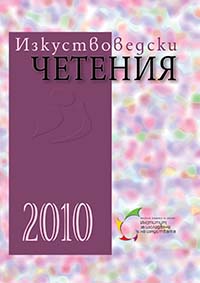Flash back към 60-те и 70-те години в българското кино
Bulgarian Cinema - Flash Back to the 1960s and 1970s
Author(s): Alexander YanakievSubject(s): Fine Arts / Performing Arts
Published by: Институт за изследване на изкуствата, Българска академия на науките
Summary/Abstract: The twenty years that have passed in Bulgaria after the changes offer a more tranquil perspective towards the recent past. Many facts from those times have not been analyzed. For example, the weak viewers’ interest for a film, such as Spetzialist po Vsichko (Master of all Hands, 1962, Petar. B. Vassilev) which today is considered a classic in the genre of comedy. To what extent really the introduction of television influenced the success of a given film. In 1960 there is less than 1 subscriber to 1000 inhabitants. The process of saturation of the households with TV sets was most rapid during the period 1966-1977. In 1965 there were 8 TV sets to 100 families and in 1970 this number reaches 42. This was the moment when the first drop in the viewers’ interest in cinema was noted – from 15 per person (the culmination of this indicator was in 1965) while in 1970 it was 13 and held up to this level until 1975. But the average number of viewers that saw a Bulgarian film dropped considerably faster – they were half the numbers during the second half of the 1960s compared to only 1/5 in the beginning of the 1960s. A strange paradox emerged – the growing number of Bulgarian feature films produced, the higher artistic level, the thematic and genre diversity led to an absolute drop in numbers in viewer’s interest for each title. There were also obviously process taking place in the Bulgarian cinema that distanced the audience during the second half of the 1960s. Omnibus type of programs with a number of novels did not have any success. The increased number of coproduction with western cinematographs only in some cases led to an increase in interest. All things considered, the influence from abroad and absurdist ideas could be seen in the case of two debutants – the Hungarian graduate Eduard Zahariev and the French graduate Georgi Stoyanov. They developed the Bulgarian cinema aesthetically and thematically but at the same time distanced the audience from their films. It is traditionally considered that the Migration cycle from the 1970s was one of the most important and representative events in the history of the Bulgarian cinema. In Eastern Europe migration during the 20th century was of different character. In my opinion it was not based on the natural development of society and industry but had a profound ideological premise. For some thirty years following the end of the Second World War the population of the cities in Bulgaria grew from 25% to almost 60%. This exceptional dynamic broke the traditional moral of society. Our cinema showed and analyzed this process.
Journal: Изкуствоведски четения
- Issue Year: 2010
- Issue No: 6
- Page Range: 283-290
- Page Count: 8
- Language: Bulgarian
- Content File-PDF

